Vada pav or kosambari? Here’s how to choose the right snacks to stay healthy
The Indian’s love for hot and delicious snacks at tea time is well known. Deep-fried snacks can be dangerous but if you choose the small portions of nutritious eats to keep hunger at bay, you can stay healthy too
There are only a few things in life that can be as satisfying as a hearty Indian snack, be it namkeens, chaat, pakoras or samosas. The 11 am or 5 pm urge to gorge on a plate of deliciously hot Indian snacks can undo even the strongest of wills and defeat all well-meaning diets. To top it off, they can be very unkind to our waistlines.
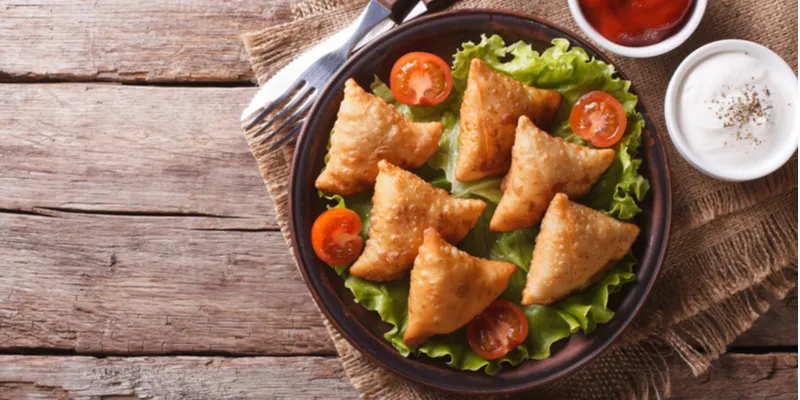
Snacks that are deep-fried can lead to weight gain
The truth, however, is that snacking is not the devil it is being made out to be. There’s in fact a lot going for it: it makes you less cranky, keeps your weight under control, and provides essential nutrients – you just need to learn (or rather relearn) how to snack right, and make that a part of the Indian way of nutrition.
The choice to snack healthy is completely in your control and with the right information and of course the will to make the change, you can find ways to have your cake and eat it too!
Get smart about it
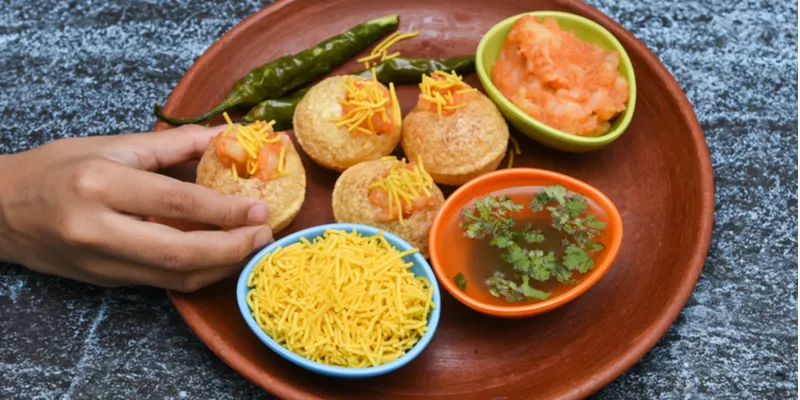
Oily snacks should be eaten in moderation
First chuck the guilt: snacking will not make you fat - only too many calories will do that. In fact, a 100 to 200 calorie snack eaten two to three hours before a meal can take the edge off your hunger and keep you from overeating.
For example, snacking on a tangy sprouts chaat or boiled chickpeas chaat will not just satisfy the taste buds but will also ensure additional fibre, protein, and multiple nutrients to your diet as long as you make both these dishes with unpolished dals from a trusted source to score the nutrients.
Here are some snacks that are safe and healthy…
Sprouts and roots salad
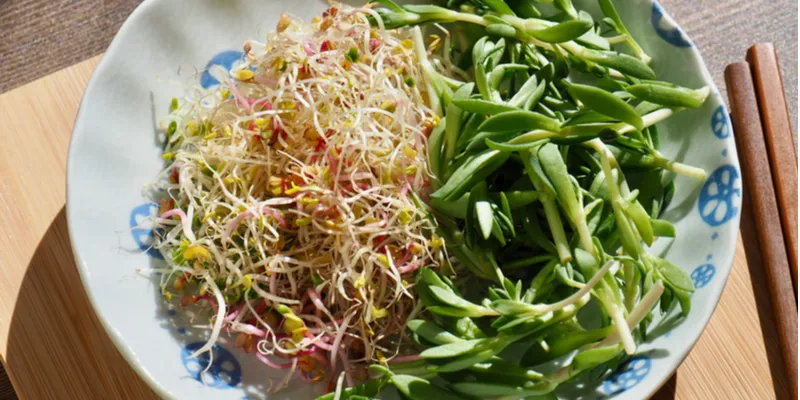
Sprouts are full of the goodness of fibre
Place sprouts, 1 boiled and diced potato, 1 shredded carrot, 1 small sliced onion, a small bunch of fresh coriander leaves, half diced radish, 2 chillies sliced, in a bowl. Add to 1 cup hung yoghurt, salt and pepper to taste. Mix well. Lay out a layer of lettuce in a platter and spoon over the salad.
Kosambari
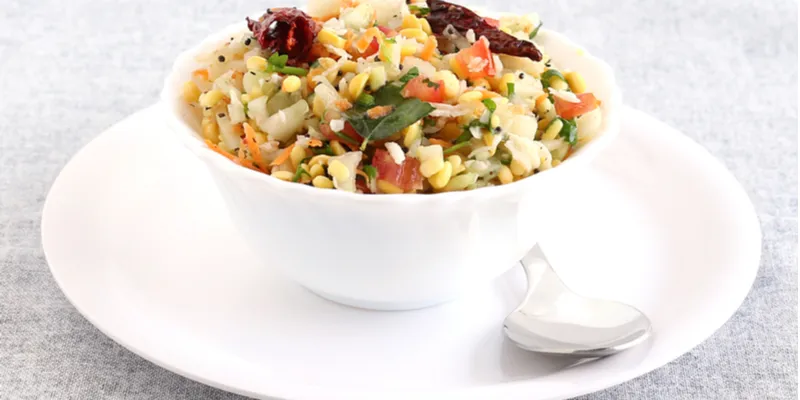
Snacks like Kosambari are healthy and delicious
Soak half a bowl of lentil (split green moong or yellow moong) for around 1 hour. Discard the water and add half grated carrot, half chopped cucumber, 1 chopped tomato, and 2 tbsp. shredded coconut to it. Add salt to taste, juice of one lemon, and some chopped coriander leaves. Mix well.
Heat 1 tsp. oil and add a pinch of mustard seeds. When they start popping, add few curry leaves, a pinch of asafetida and 2 red chillies, broken into pieces. Mix well, place some finely chopped apple on top and dig in.
Always be Prepared
It pays to be prepared with alternatives. If you don’t have something healthy handy, you will obviously grab the first thing that’s around, when you want to munch, so plan ahead of time. So, to miraculously turn into a smart snacker, keep your fridge and kitchen stocked with healthy goodies.
For example, if you missed lunch and are feeling hungry, a quick cheela or dhokla made from good quality besan (made from unpolished chana dal) will be a perfect choice.
Also, always stock healthy ready-to-cook mixes from trusted sources. Similarly, if you have some delicious hummus ready in the fridge, you could have it with cucumber sticks rather than something unhealthy.
Try this:
Hummus with Cucumber sticks
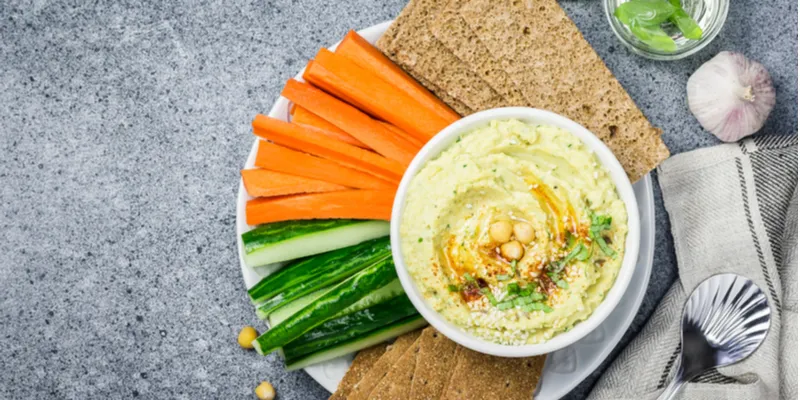
Hummus served with cucumber and carrot sticks
Soak 1 cup chickpeas in 4 cups water overnight. Pressure cook on high for 5 whistles, and then on low for half an hour. Grind in a mixer for 1 minute. Add 1/2 cup sesame paste (sesame seeds ground), 2 pounded garlic cloves, 1/3rd cup lemon juice and 2 tbsp. olive oil and salt to taste. Cut a cucumber into sticks, sprinkle salt and pepper, refrigerate and munch on them all day long!
Beat the midnight snack, healthily
For all those who end up snacking at midnight, try having a pre-sleep snack of a high tryptophan food (it’ll lull you to sleep). Chickpeas, dairy, and eggs are naturally high in tryptophan (that’s why a glass of milk at bedtime is such a good idea).
Finally, follow these three golden rules to ensure good health:
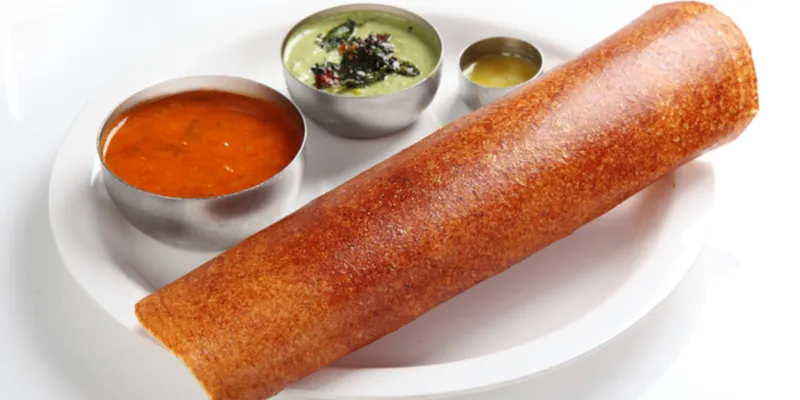
Masala dosa is not a snack, it is a meal
Learn to differentiate between feasting and snacking.
A big burger with fries is not a snack- it’s a meal. Nor is a masala dosa or for that matter vada pav. Get this difference straight off.
Snacks are meant to be small
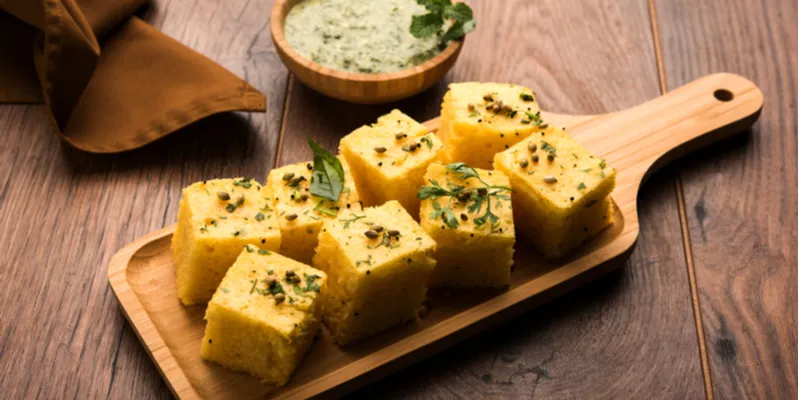
A small portion of dhokla is a healthy snack
Eat small and satisfying portions, more along the lines of say half a plate of bhel (if it is junk that you are craving), or 2 pieces of dhokla.
And always snack to satisfy hunger, not boredom
With these in check, you are on your way to snacking right, the Indian way!
(Images credit: Shutterstock)
Edited by Asha Chowdary







